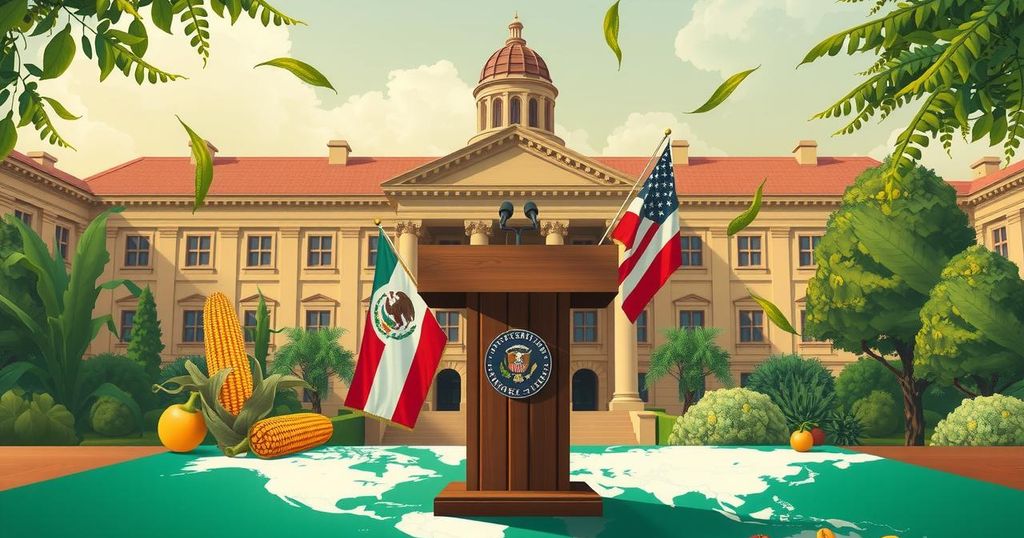Overview of Mexico’s Trade Position and Food Sovereignty Goals

President Claudia Sheinbaum discussed the implications of U.S. reciprocal tariffs and Mexico’s ambitions for food sovereignty during her recent press conference. She highlighted benefits from the USMCA agreement for exporters and outlined set targets for increasing the production of vital agricultural products by 2030. Additionally, Sheinbaum announced her short attendance at the CELAC summit in Honduras next week as part of her international engagements.
In a recent press conference, President Claudia Sheinbaum responded to inquiries regarding the potential benefits of the United States’ reciprocal tariffs and Mexico’s food production goals. Sheinbaum expressed confidence that Mexico is in a favorable position due to its proximity to the U.S. and the provisions of the USMCA agreement. She highlighted that many Mexican products can be exported tariff-free, presenting a competitive advantage over countries in Asia and Europe.
Sheinbaum underscored that while her administration does not wish harm to other nations, Mexico stands to benefit from these tariffs. She stated that despite facing similar tariffs as other countries for specific goods like steel and aluminum, Mexico enjoys lower transportation costs, enhancing its competitiveness. The president affirmed that this advantageous position is significant for companies seeking to invest in Mexico.
Minister of Agriculture and Rural Development, Julio Berdegué, elaborated on Mexico’s ambitious food production targets, which were outlined by Sheinbaum. The government aims to significantly boost domestic production of essential products by 2030, including a 17% increase in corn, a 64% increase in beans, a 103% increase in rice, and a 15% increase in milk. Berdegué expressed optimism that these targets are achievable due to government support programs designed to assist farmers.
For these initiatives, the government has allocated approximately 54 billion pesos (around US $2.64 billion) for the support of farmers, including the provision of high-quality seeds and access to new agricultural technologies. The new Harvesting Sovereignty scheme will be instrumental in this effort.
Additionally, President Sheinbaum announced her brief attendance at the upcoming CELAC summit in Honduras, stating she would spend approximately two hours at the event. This will mark her second international trip since assuming office. She emphasized her commitments at home but expressed a willingness to engage with fellow leaders, stating that her attendance was influenced by her counterpart, President Xiomara Castro.
Due to time constraints, Sheinbaum will utilize a Ministry of National Defense plane for her travel, as commercial flight options are limited.
In summary, President Claudia Sheinbaum indicated that Mexico is strategically positioned to benefit from the U.S. reciprocal tariffs while simultaneously pursuing ambitious food production goals, assisted by substantial government investment in agriculture. She also outlined her commitment to international cooperation through her upcoming visit to the CELAC summit, indicating a balanced approach to domestic priorities and regional engagement.
Original Source: mexiconewsdaily.com








